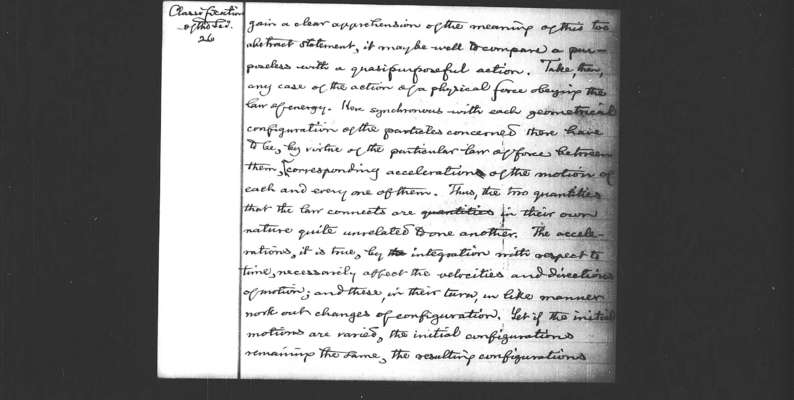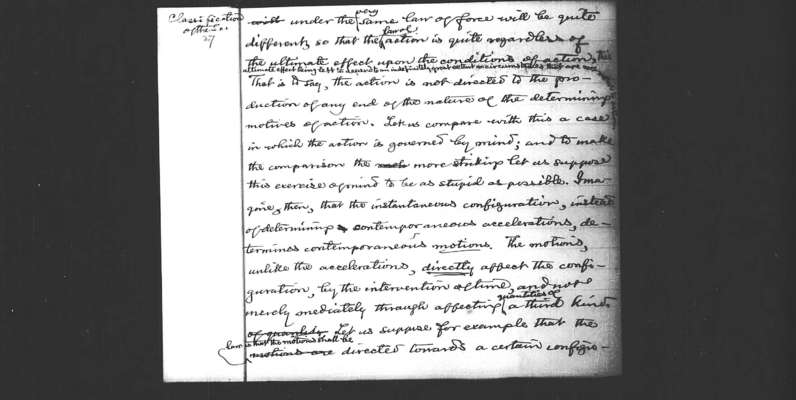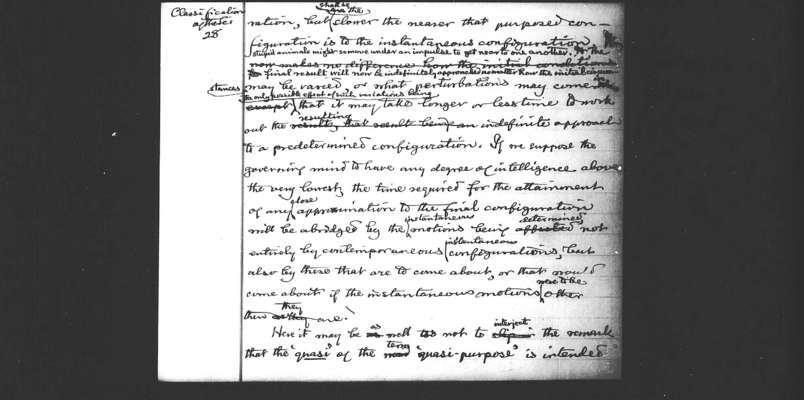Pages
26
Classification of the Sci. 26
gain a clear apprehension of the meaning of this too abstract statement, it may be well to compare a purposeless with a quasipurposeful action. Take, then, any case of the action of a physical force obeying the law of energy. Here synchronous with each geometrical configuration of the particles concerned there have to be, by virtue of the particular law of force between them, corresponding acceleration of the motion of each and every one of them. Thus, the two quantities that the law connects are in their own nature quite unrelated to one another. The accelerations, it is true, by integration with respect to time, necessarily affect the velocities and directions of motion; and these, in their turn, in like manner work out changes of configuration. Yet if the initial motions are varied, the initial configurations remaining the same, the resulting configurations
27
Classification of the Sci 27
under the very same law of force will be quite different, so that the law of action is quite regardless of the ultimate effect upon the conditions of action, this ultimate effect being left to depend to an indefinitely great extent on circumstances that are not motive to action. That is to say, the action is not directed to the production of any end of the nature of the determining motives of action. Let us compare with this a case in which the action is governed by mind; and to make the comparison the more striking let us suppose this exercise of mind to be as stupid as possible. Imagine, then, that the instantaneous configuration, instead of determining contemporaneous accelerations, determines contemporaneous motions. The motions, unlike the accelerations, directly affect the configuration, by the intervention of time, and not merely mediately through affecting quantities of a third kind. Let us suppose for example that the law is that the motions shall be directed towards a certain configu-
28
Classification of the Sci 28
ration, but shall be the slower the nearer that purposed configuration is to the instantaneous configuration. Very stupid animals might so move under an impulse to get near to one another. The final result will now be indefinitely approached no matter how the initial circumstances may be varied, or what perturbations may come, the only possible effect of such variations being that it may take longer or less time to work out the resulting indefinite approach toa predetermined configuration. If we suppose the governing mind to have any degree of intelligence above the very lowest, the time required for the attainment of any close approximation to the final configuration will be abridged by the instantaneous motions being determined not entirely by contemporaneous instantaneous configurations, but also by those that are to come about, or that would come about if the instantaneous motions were to be other than they are.
Here it may be as well as not to interject the remark that the 'quasi' of the term 'quasi-purpose' is intended
29
Classification of the Sci. 29
so far to generalize the meaning as to include final causes other than those that centre in human brains, but is by no means to be understood as an acknowledgment that an end to which there will be a tendency though any conditions that do not essentially or formally concern it are altered can fail to be a true cause. For the very type and prototype of what the word cause means is the sense in which, for example, my desire for fresh air may cause me to [get??] up from my chair, cross the room, and open the window. If one wishes to use the word in a very strict sense, one may reasonably object to saying that a mechanical force is a cause of motion, instead of calling it the time-slope of a motion. But however strictly the word be used, the volitions of a human mind will be, par excellence, causes of mechanical motions. Now from what has just been said it is obvious to anybody
30
Classification of the Sci. 30
familiar with the fundamentals of dynamics that if physical forces obey the law of the conservation of energy, then a volition cannot be a force. For a volition is motived by every circumstance that is seen to have an influence upon the desired result, while the result of the action of a conservative force depends on two factors, the initial positions and the initial states of motion, only the former of which influences the force, the latter being left to produce such effect as it may. The force cannot be influenced by the velocities without thereby violating the law of the conservation of energy. So vague are the notions that prevail on this subject, that many persons will exclaim, "But surely all events in the physical world are governed by force!" Let us admit, for the sake of argument, what has perhaps been rendered probably, and perhaps not, but has certainly not been rendered nearly certain, that the laws of dynamics, including the law of the conservation of energy, together with certain fixed laws of physics, are never violated in any sensible measure; but that whatever they prescribe is sensibly true:




